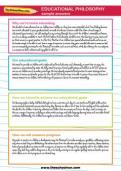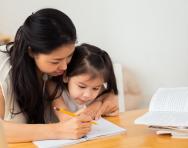Home education around the world

In all four countries of the UK, parents have the right to educate their child at home rather than sending them to school. But in other parts of the world, deciding to home educate is an even bigger deal.


Free home education planning pack & resources
- Guidance, templates & advice
- Practical tips from experts and parents
- How to establish a routine and set goals
In certain countries, including Sweden, Germany and Cyprus, home education is illegal. But in others, including Australia and the USA, the home education movement is far bigger than in the UK. In fact, the vast geographical distances between communities in remote Australia mean that home education is the norm, with many children attending the 'world's biggest classroom,' The School of the Air, which educates children living in 1.5 million square kilometres of Outback over two-way radio.
So what's it like to home educate a child in different parts of the world? We take a look at the rules and regulations, and meet some of the families who are doing it.
New Zealand
Home education is allowed in New Zealand, but families must satisfy their local Ministry of Education that their child will be taught at least as regularly and as well as they would at school, and gain a Certificate of Exemption for each child. All families with a Certificate of Exemption are eligible for financial support, currently $743 per year for the first child, with lower amounts payable for subsequent children.
Children living in remote areas can be enrolled in Te Kura, a correspondence school that covers early years through to Year 13. This is not classed as home education.
Mike and Krissie Phipps live in Rotorua and have home educated their three sons, Jeremy, 14, Zane, 12, and Anthony, nine, since they were five. 'As a teenager, I spent four years doing correspondence school, which I found suited me better than school' Krissie explains. 'I wanted to raise my children the same way, with my values and experiences. I believe we have made a very special decision. The bond between each of us is strong and I feel my boys have a level of confidence I may not have seen otherwise. I also enjoy the opportunity to encourage the boys to discover their own identity and purpose.'
Rotorua has a high level of home educators, especially at high-school level. 'I help organise a group on Fridays where we socialise, do team sports and learn together,' Krissie says. 'We have 50 to 60 students, half of whom are aged 13 and over, and older students come back and visit when they're free from work or tertiary studies. The range of ages mixes beautifully.'
New Zealand's Ministry of Education has more information on home education.
Bulgaria
Bulgaria is one of the most recent countries to legalise home education. A law passed in August 2016 includes the right to a so-called 'individual' education, which includes home education. This reflects the growing popularity of home education in the country: in the past 11 years, the numbers of home educating families has grown from five to over 300.
The new legislation requires families to follow a government-approved educational policy, which leads to children being able to take the national diploma, qualifying them for university entrance in Bulgaria and other European countries. However, some families feel that the law doesn't go far enough, as it doesn't allow them to follow their own educational philosophy that takes into account their religious views, for example.
South Africa
During apartheid, home education was illegal – in fact, the parents of one family were jailed in 1994 for teaching their children at home. Although home education is permitted now, South Africa remains one of the most regulated countries for home educators. Parents must register their intention to home educate and follow an approved curriculum. They need to provide records of their child’s progress, proof of end-of-year assessment and evidence that they've achieved the required standard for their age at the end of Grades 3, 6 and 9. It's estimated that between 100,000 and 150,000 children are home educated in the country.
Joy Leavesley lives in Johannesburg and home educated her children Tom,11, and Anna, seven. 'We wanted to provide a tailor-made education and to allow our children’s learning to be in a family and community setting rather than at an institutional setting,' she explains. 'I’ve noticed that in the last five years, home education has been gaining traction here as the quality of state education provision has declined and the spaces available for children with special needs have dwindled. More people now see it as a viable alternative to costly private and/or special schools. It's a pity that homeschooling has the word school in it, because we do so very little that is like a school.'
Germany
Germany is one of the few European countries where home education is still illegal, in an attempt to avoid creating 'closed-off parallel societies.' Some families choose to go ahead regardless, but there are risks: the media has reported cases of parents being fined or losing their jobs, and of children being forcibly taken to school by police, and even being taken into care by social services.
Many German families who want to home educate their children resort to moving to another country. Writing for American home schooling advocacy organisation HSLDA, parent Isa Hauck explains how she moved her family to the French side of the border. 'Living right across the border is a very good solution,' she explains. 'Here in Alsace, there are several home school families whose fathers work in Germany or Switzerland. Life is expensive here, and it is hard to leave your home country, but we know that it is worth everything as we see our children prosper under the guided education that home schooling offers.'
United States of America
An estimated 1.5 million children are home educated in the USA, according to Ann Zeise, who home educated her son for 10 years in California and now runs one of the country’s most comprehensive websites for parents on the subject, a2zhomeschooling.com. Home education is legal across the United States but each state has its own rules about the amount of regulation families need to adhere to. As an example, Texas, Oklahoma and Idaho have relaxed rules, whereas Vermont, New York and Pennsylvania have stricter requirements.
A higher than average number of child actors means home education is popular in Los Angeles, says expert Hunter Maats, the co-author of The Straight-A Conspiracy, a book about how high school students can learn at home. 'For child actors, home schooling offers a lot of flexibility,' he explains. 'In the US, there is also a huge Christian home school community. Other kids home school who struggle socially in school with drugs and alcohol, or just with not fitting in. There used to be a stigma about home school kids being weird and not properly socialised, but I think that has lessened a lot in recent years.'
Saudi Arabia
Home education is not officially recognised in Saudi Arabia and many of the other Middle Eastern countries, but it's a popular option amongst ex-pat families in particular. However, the lack of official recognition means it can be hard to find resources and support, so many families use tutoring services or online schools instead.
Cephanie Keightley moved to Saudi Arabia with her son Joseph, now 13, and found it hard to enrol him in an international school. 'The British International School was financially out of reach and the other international schools didn't value the British education Joseph had had, and wanted him to repeat a year. I spoke to other ex-pats, and they mentioned home schooling,' she explains. 'I chose a British home learning company, Oxford Open Learning, which posts supplies to Saudi Arabia, and Joseph works with a tutor five days a week from 7.30am until noon, in keeping with Saudi termtimes. It's expensive, but through learning at home, Joseph has matured significantly over the past three years and learnt how to manage his time better and work independently.'
Australia
This enormous continent boasts the world’s largest classroom, The School of the Air, which educates children in the outback over the radio. Lessons are broadcast through 16 schools covering 1.5 million square kilometres, and can also be accessed by children travelling around Australia or who are unable to attend school because of medical or other reasons. Secondary students and adult education are also included.
According to the Home Education Association, an estimated one to two per cent of the Australian population is home educated. It's legal in all states, but each can decide whether families need to register their intention.
Heather and Steve Jonsson live on a cattle station in the outback. Their closest school is three and a half hours’ drive away, so their four boys (Nait, four, Emmit, six, Ethan, 14, and Morgan, 15) learn both educational and farm skills at home. 'School work always comes first,' says Heather. 'We cover English, mathematics, history, geography, science, technology and the arts. The boys have learnt basic coding, metalwork, woodwork and learnt to sew. Currently Morgan is completing a certificate in agriculture, and the three older boys have also competed in science competitions, reaching second in the state for their grade level.
'They have had a lot of great learning experiences on the land and have perseverance, a can-do attitude and know how to think outside the box,' Heather continues. 'There's an active home school group in a town about five hours' drive away, and we go there every five or six weeks. There are great events, from touring medical ships to drama workshops. We also belong to an organisation called Isolated Children's Parents Association, which organises sporting events for bush kids. I'm not worried what career the boys have in mind – cattle-station life is not for everyone, but Morgan looks like he will work on the land while Ethan has talked about going to university.'

Give your child a headstart
- FREE articles & expert information
- FREE resources & activities
- FREE homework help








